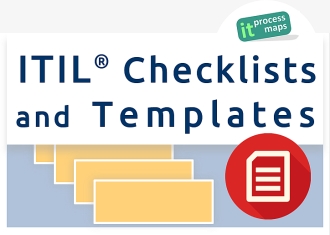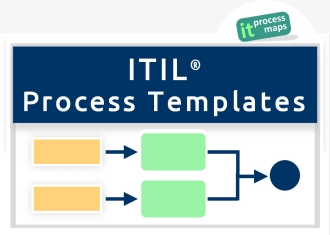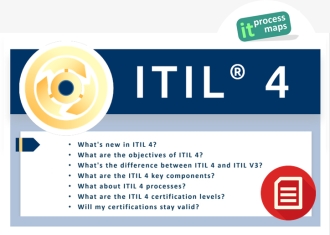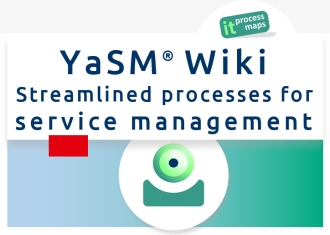ITIL Implementation - Process Design: Difference between revisions
No edit summary |
No edit summary |
||
| (4 intermediate revisions by the same user not shown) | |||
| Line 1: | Line 1: | ||
<itpmch><title>ITIL Implementation - Process Design | IT Process Wiki</title> | <itpmch><title>ITIL Implementation - Process Design | IT Process Wiki</title> | ||
<meta name="keywords" content="itil process design, itil process flow" /> | <meta name="keywords" content="itil process design, itil process flow" /> | ||
<meta name="description" content="ITIL Process Design - | <meta name="description" content="The 'Process design' step is about specifying in detail which activities need to be performed within each ITIL process." /> | ||
<meta property="og:url" content="https://wiki.en.it-processmaps.com/index.php/ITIL_Implementation_-_Project_Preparation" /> | |||
<meta property="og:title" content="ITIL Implementation - Process Design | IT Process Wiki" /> | |||
<meta property="og:description" content="The 'Process design' step is about specifying in detail which activities need to be performed within each ITIL process." /> | |||
<meta property="og:site_name" content="IT Process Wiki - the ITIL® Wiki"> | |||
<meta property="og:type" content="article" /> | |||
<meta property="fb:admins" content="100002035253209" /> | |||
<meta property="fb:admins" content="100002592864414" /> | |||
<meta property="og:image" content="https://wiki.en.it-processmaps.com/images/b/b4/8-itil-implementation-process-design.jpg" /> | |||
<meta property="og:image:width" content="1200" /> | |||
<meta property="og:image:height" content="600" /> | |||
<link href="https://plus.google.com/108613479011811316823/posts" rel="publisher" /> | |||
</itpmch> | </itpmch> | ||
<imagemap> | <imagemap> | ||
Image:ITIL-Wiki-de-es.jpg|DE - ES - ITIL Process Design - Designing the ITIL Processes| | Image:ITIL-Wiki-de-es.jpg|right|DE - ES - ITIL Process Design - Designing the ITIL Processes|163px | ||
rect 0 | rect 81 0 114 36 [https://wiki.de.it-processmaps.com/index.php/ITIL-Implementierung_-_Prozess-Design diese Seite auf Deutsch] | ||
rect | rect 115 0 163 36 [https://wiki.es.it-processmaps.com/index.php/Implementaci%C3%B3n_de_ITIL_-_Dise%C3%B1ando_los_procesos esta página en español] | ||
desc none | desc none | ||
</imagemap> | </imagemap> | ||
<br style="clear:both;"/> | <br style="clear:both;"/> | ||
[[image:Designing-itil-processes-in detail-step-8.jpg|thumb|285px|right|alt=Designing the ITIL Processes in Detail. ITIL implementation, step 8.|link=https://wiki.en.it-processmaps.com/index.php/File:Designing-itil-processes-in detail-step-8.jpg|[[Media:Designing-itil-processes-in detail-step-8.jpg|Infographic: Designing the ITIL processes in detail. - ITIL implementation, step 8.]]]] | |||
{| | {| | ||
|- | |- | ||
|style="border-bottom:1px solid grey;"| | |style="border-bottom:1px solid grey; font-size:130%"|<strong>Step 8: Designing the ITIL Processes in Detail </strong> | ||
|} | |} | ||
<p> </p> | <p> </p> | ||
The 'Process design' step is about specifying in detail which activities need to be performed within each ITIL process. | |||
<p> </p> | |||
__TOC__ | |||
===<span id="Objective of this Project Step">Objectives</span>=== | ===<span id="Objective of this Project Step">Objectives</span>=== | ||
| Line 27: | Line 41: | ||
*Definition of guidelines/ checklists to support process execution | *Definition of guidelines/ checklists to support process execution | ||
*Detailed definition of the process outputs | *Detailed definition of the process outputs | ||
<br style="clear:both;"/> | |||
< | |||
==Description== | ==Description== | ||
Typically, the [[ITIL Roles#Process Owner|process owners]] will be responsible for this task. All relevant parties should be involved, especially members of staff who will execute the processes, to ensure that their experiences and knowledge is taken into account when designing the processes. | |||
[[Image:Thumb-itil-process-flow.jpg|thumb|400px|right|alt=ITIL process design|link=https://wiki.en.it-processmaps.com/index.php/File:Thumb-itil-process-flow.jpg|Fig. 1: Detailed Process Descriptions (ITIL process flows)]] | |||
The process designs are usually documented in the form of flowchart diagrams. These should provide a clear idea of the required activities and their sequential order, without going into unnecessary detail. The diagrams will also specify the roles responsible for executing the activities. | |||
The ITIL® Process Map supports this task with a complete set of flowcharts which can be adapted to the specific needs of particular organizations (see fig. 1: [[Media:Thumb-itil-process-flow.jpg|ITIL process flows]]). | |||
To keep the process diagrams readable and focused, additional information to support the process execution should be attached to the flowchart diagrams in the form of linked [[ITIL-Checklists|checklists and document templates]]. An example would be a document containing detailed instructions for the registration and routing of incidents or service requests in 1st level support. | |||
==Prerequisites== | ==Prerequisites== | ||
| Line 49: | Line 60: | ||
*[[ITIL Implementation - Process Interfaces|Interfaces of the ITIL processes]] to be introduced | *[[ITIL Implementation - Process Interfaces|Interfaces of the ITIL processes]] to be introduced | ||
*[[ITIL Key Performance Indicators|Measures (KPIs) for the ITIL processes]] to be introduced | *[[ITIL Key Performance Indicators|Measures (KPIs) for the ITIL processes]] to be introduced | ||
==Results/ Deliverables== | ==Results/ Deliverables== | ||
*Detailed process descriptions in the form of | *Detailed process descriptions in the form of flowchart diagrams and activity chains | ||
*[[ITIL-Checklists| | *Possibly: Additional [[ITIL-Checklists|guidelines / checklists]], instructions, etc. | ||
*Definitions of the process outputs | *Definitions of the process outputs | ||
==Success factors== | |||
==Success | |||
*Process descriptions should give a clear idea of the required activities and their sequential order, but too many details should be avoided. Too much detail usually means that these documents are soon out of date, as they are too bulky to be an effective tool for the Process Owners. | *Process descriptions should give a clear idea of the required activities and their sequential order, but too many details should be avoided. Too much detail usually means that these documents are soon out of date, as they are too bulky to be an effective tool for the Process Owners. | ||
| Line 68: | Line 75: | ||
*It is decisive for a successful process implementation to include all the relevant parties in this phase of the project, in order to make use of their wide range of experiences from daily business, and to ensure that the redesigned processes will be accepted and adhered to. | *It is decisive for a successful process implementation to include all the relevant parties in this phase of the project, in order to make use of their wide range of experiences from daily business, and to ensure that the redesigned processes will be accepted and adhered to. | ||
==Relevant Views of the ITIL Process Map== | |||
Being well prepared is essential at this point in order to avoid the risk of producing a large number of uncorrelated and oversized documents. | |||
[[Image:Itil-templates.jpg|thumb|400px|right|alt=ITIL templates and checklists|link=https://wiki.en.it-processmaps.com/index.php/File:Itil-templates.jpg|Fig. 2: [[ITIL-Checklists|ITIL templates and checklists]] are used to enhance the ITIL process flows]] | |||
This is why our method of "ITIL Implementation Using ITIL Process Templates" takes great care to set up a framework of process structure and interfaces during the initial project steps. Due to the prior definition of the project interfaces, it is already established upon which inputs a process may build, and which results it must deliver for successive processes. | |||
With this information clearly specified it becomes much easier to define a process flow in a simple, straightforward way. | |||
<br style="clear:both;"/> | <br style="clear:both;"/> | ||
The [https://en.it-processmaps.com/products/itil-process-map.html ITIL Process Map] makes detailed process flows available for all ITIL processes (see fig. 1: [[Media:Thumb-itil-process-flow.jpg|ITIL process flows]]). These models fulfill the current requirements of ITIL. | |||
Modifications will often be necessary to allow for special circumstances or preferences; these alterations are of course permitted, as long as the ITIL guiding ideas are followed. | |||
<p> </p> | <p> </p> | ||
<html> | <html> | ||
<a href="https://demo.it-processmaps.com/howto_en/using-itil-process-map.html" ><img src="https://demo.it-processmaps.com/howto_en/video-using-itil-process-templates.jpg" width="253" height="150" class="thumbimage" alt="Video: Adapting the ITIL Process Model to your Organization" title="Start the video: Adapting the ITIL Process Map" style="display: block; float: left; margin-left: 10px; margin-bottom: 10px; margin-right: 30px" /></a> | |||
<p style="margin-top: 0; word-wrap:normal;">Learn how to adapt the pre-configured ITIL best practice templates to the requirements of your organization:</p> | |||
< | <p>Watch the video: "<a href="https://demo.it-processmaps.com/howto_en/using-itil-process-map.html" title="Start the video: Adapting the ITIL Process Map">Using the ITIL Process Map</a>" (10:02 min.) | ||
<br style="clear:both;"/></html> | |||
<br style="clear:both;"/> | |||
As an addition to the detailed ITIL process flows, checklists/ document templates (see fig. 2: [[Media:Itil-templates.jpg|ITIL templates]]) are available within the ITIL Process Map, describing procedures or process outputs in detail where necessary. | |||
We make samples of our ITIL document templates and checklists available for you in this IT Process Wiki: | |||
→ [[ITIL-Checklists# | → [[ITIL-Checklists#ITIL_Templates|"The most sought-after ITIL templates"]]. | ||
<br style="clear:both;"/> | |||
==Resources== | |||
*[1] [[ITIL-Checklists|Detailed ITIL templates and checklists]] for defining ITIL process outputs and inputs | *[1] [[ITIL-Checklists|Detailed ITIL templates and checklists]] for defining ITIL process outputs and inputs | ||
*[2] More on [[ITIL Implementation with Process Templates|ITIL implementation with process templates]] | *[2] More on [[ITIL Implementation with Process Templates|ITIL implementation with process templates]] | ||
*[3] [https://en.it-processmaps.com/general/faq.html FAQ: ITIL reference processes]; IT Process Maps. | *[3] [https://en.it-processmaps.com/general/faq.html FAQ: ITIL reference processes]; IT Process Maps. | ||
*[4] Structure and contents of an ITIL process model: [https://demo.it-processmaps.com/visio_en/itil-process-map.html Video: Introduction - ITIL Process Map]; IT Process Maps. | *[4] Structure and contents of an ITIL process model: [https://demo.it-processmaps.com/visio_en/itil-process-map.html Video: Introduction - ITIL Process Map]; IT Process Maps. | ||
*[5] Business Process Model and Notation (BPMN) version 2.0 - Specification, as of January | *[5] Business Process Model and Notation (BPMN) version 2.0.2 - Specification, as of January 2014: [https://www.omg.org/spec/BPMN/ omg.org/spec/BPMN/] and [https://www.omg.org/spec/BPMN/2.0.2/PDF omg.org/spec/BPMN/2.0.2/PDF]. | ||
==Following project activity== | |||
→ ITIL Implementation - Step 9: '''[[ITIL Implementation - Application Systems|Selection and Implementation of Application Systems]]''' | |||
== | ==Notes== | ||
&# | <html>By:  Andrea Kempter <a rel="author" href="https://www.linkedin.com/in/andreakempter"><img style="margin:0px 0px 0px 0px;" src="/images/bookmarking/linkedin.png" width="16" height="16" title="By: Andrea Kempter | Profile on LinkedIn" alt="Author: Andrea Kempter, IT Process Maps GbR" /></a>, IT Process Maps. | ||
<p> </p> | <p> </p> | ||
== | <p><small> | ||
<span itemprop="breadcrumb" itemscope itemtype="http://schema.org/BreadcrumbList"> | |||
<span itemprop="itemListElement" itemscope itemtype="http://schema.org/ListItem"> | |||
<a itemprop="item" href="https://wiki.en.it-processmaps.com/index.php/ITIL_Implementation_-_Process_Design#Objectives"> | |||
<span itemprop="name">Objectives</span></a> | |||
<meta itemprop="position" content="1"></span> › | |||
<span itemprop="itemListElement" itemscope itemtype="http://schema.org/ListItem"> | |||
<a itemprop="item" href="https://wiki.en.it-processmaps.com/index.php/ITIL_Implementation_-_Process_Design#Description"> | |||
<span itemprop="name">Description</span></a> | |||
<meta itemprop="position" content="2"></span> › | |||
<span itemprop="itemListElement" itemscope itemtype="http://schema.org/ListItem"> | |||
<a itemprop="item" href="https://wiki.en.it-processmaps.com/index.php/ITIL_Implementation_-_Process_Design#Prerequisites"> | |||
<span itemprop="name">Prerequisites</span></a> | |||
<meta itemprop="position" content="3"></span> › | |||
<span itemprop="itemListElement" itemscope itemtype="http://schema.org/ListItem"> | |||
<a itemprop="item" href="https://wiki.en.it-processmaps.com/index.php/ITIL_Implementation_-_Process_Design#Results.2F_Deliverables"> | |||
<span itemprop="name">Results/ Deliverables</span></a> | |||
<meta itemprop="position" content="4"></span> › | |||
<span itemprop="itemListElement" itemscope itemtype="http://schema.org/ListItem"> | |||
<a itemprop="item" href="https://wiki.en.it-processmaps.com/index.php/ITIL_Implementation_-_Process_Design#Success_Factors"> | |||
<span itemprop="name">Success Factors</span></a> | |||
<meta itemprop="position" content="5"></span> | |||
</span> | |||
</small></p> | |||
< | <!-- define schema.org/WebPage --> <span itemscope itemtype="https://schema.org/WebPage"> | ||
< | <meta itemprop="name" content="ITIL Implementation - Process Design" /> | ||
< | <meta itemprop="description" content="The 'Process design' step is about specifying in detail which activities need to be performed within each ITIL process." /> | ||
< | <link itemprop="url" href="https://wiki.en.it-processmaps.com/index.php/ITIL_Implementation_-_Process_Design" /> | ||
<meta itemprop="inLanguage" content="en" /> | |||
<link itemprop="citation" href="https://wiki.de.it-processmaps.com/index.php/ITIL-Implementierung_-_Prozess-Design" /> | |||
<link itemprop="citation" href="https://wiki.es.it-processmaps.com/index.php/Implementaci%C3%B3n_de_ITIL_-_Dise%C3%B1ando_los_procesos" /> | |||
< | <meta itemprop="Headline" content="ITIL Implementation - Process Design" /> | ||
</ | <meta itemprop="alternativeHeadline" content="Step 8: Designing the ITIL processes in detail" /> | ||
< | <link itemprop="primaryImageOfPage" href="https://wiki.en.it-processmaps.com/images/7/72/Thumb-itil-process-flow.jpg" title="Detailed process descriptions" /> | ||
<link itemprop="author" href="https://www.linkedin.com/in/andreakempter" /> | |||
<meta itemprop="author" content="Andrea Kempter" /> | |||
< | <meta itemprop="creator copyrightHolder publisher" content="IT Process Maps" /> | ||
</span><p></html> | |||
</ | |||
< | |||
<!-- This page is assigned to the following categories: --> | <!-- This page is assigned to the following categories: --> | ||
[[Category:ITIL V3]][[Category:ITIL 2011]][[Category:ITIL implementation]] | [[Category:ITIL V3]][[Category:ITIL 2011]][[Category:ITIL implementation]] | ||
<!-- --- --> | <!-- --- --> | ||
Latest revision as of 14:53, 5 April 2022

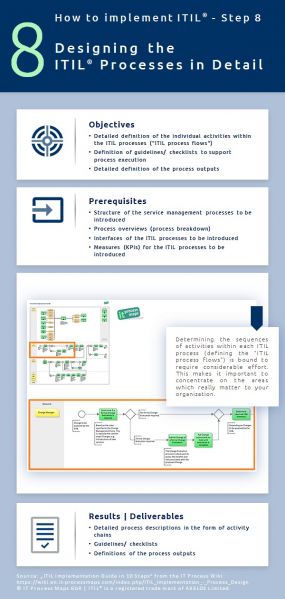
| Step 8: Designing the ITIL Processes in Detail |
The 'Process design' step is about specifying in detail which activities need to be performed within each ITIL process.
Objectives
- Detailed definition of the individual activities within the ITIL processes ("ITIL process flows")
- Definition of guidelines/ checklists to support process execution
- Detailed definition of the process outputs
Description
Typically, the process owners will be responsible for this task. All relevant parties should be involved, especially members of staff who will execute the processes, to ensure that their experiences and knowledge is taken into account when designing the processes.
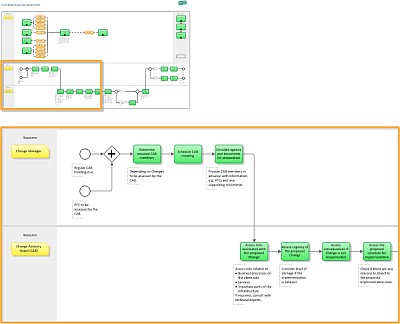
The process designs are usually documented in the form of flowchart diagrams. These should provide a clear idea of the required activities and their sequential order, without going into unnecessary detail. The diagrams will also specify the roles responsible for executing the activities.
The ITIL® Process Map supports this task with a complete set of flowcharts which can be adapted to the specific needs of particular organizations (see fig. 1: ITIL process flows).
To keep the process diagrams readable and focused, additional information to support the process execution should be attached to the flowchart diagrams in the form of linked checklists and document templates. An example would be a document containing detailed instructions for the registration and routing of incidents or service requests in 1st level support.
Prerequisites
- Structure of the Service Management processes to be introduced
- Process overviews (process breakdown)
- Interfaces of the ITIL processes to be introduced
- Measures (KPIs) for the ITIL processes to be introduced
Results/ Deliverables
- Detailed process descriptions in the form of flowchart diagrams and activity chains
- Possibly: Additional guidelines / checklists, instructions, etc.
- Definitions of the process outputs
Success factors
- Process descriptions should give a clear idea of the required activities and their sequential order, but too many details should be avoided. Too much detail usually means that these documents are soon out of date, as they are too bulky to be an effective tool for the Process Owners.
- It is recommended to confine further details into linked documents (e. g. guidelines and definitions of process outputs).
- It is decisive for a successful process implementation to include all the relevant parties in this phase of the project, in order to make use of their wide range of experiences from daily business, and to ensure that the redesigned processes will be accepted and adhered to.
Relevant Views of the ITIL Process Map
Being well prepared is essential at this point in order to avoid the risk of producing a large number of uncorrelated and oversized documents.
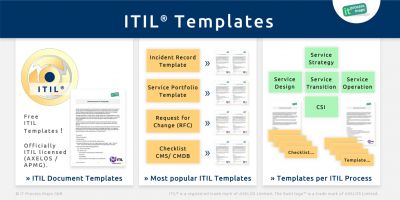
This is why our method of "ITIL Implementation Using ITIL Process Templates" takes great care to set up a framework of process structure and interfaces during the initial project steps. Due to the prior definition of the project interfaces, it is already established upon which inputs a process may build, and which results it must deliver for successive processes.
With this information clearly specified it becomes much easier to define a process flow in a simple, straightforward way.
The ITIL Process Map makes detailed process flows available for all ITIL processes (see fig. 1: ITIL process flows). These models fulfill the current requirements of ITIL.
Modifications will often be necessary to allow for special circumstances or preferences; these alterations are of course permitted, as long as the ITIL guiding ideas are followed.
Learn how to adapt the pre-configured ITIL best practice templates to the requirements of your organization:
Watch the video: "Using the ITIL Process Map" (10:02 min.)
As an addition to the detailed ITIL process flows, checklists/ document templates (see fig. 2: ITIL templates) are available within the ITIL Process Map, describing procedures or process outputs in detail where necessary.
We make samples of our ITIL document templates and checklists available for you in this IT Process Wiki:
→ "The most sought-after ITIL templates".
Resources
- [1] Detailed ITIL templates and checklists for defining ITIL process outputs and inputs
- [2] More on ITIL implementation with process templates
- [3] FAQ: ITIL reference processes; IT Process Maps.
- [4] Structure and contents of an ITIL process model: Video: Introduction - ITIL Process Map; IT Process Maps.
- [5] Business Process Model and Notation (BPMN) version 2.0.2 - Specification, as of January 2014: omg.org/spec/BPMN/ and omg.org/spec/BPMN/2.0.2/PDF.
Following project activity
→ ITIL Implementation - Step 9: Selection and Implementation of Application Systems
Notes
By: Andrea Kempter ![]() , IT Process Maps.
, IT Process Maps.
Objectives › Description › Prerequisites › Results/ Deliverables › Success Factors



